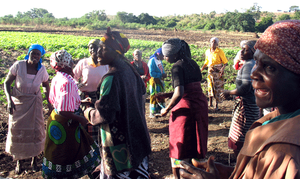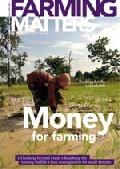The eagle flies in Zambia: Zambian Breweries, a subsidiary of the brewing giant SABMiller, produces a local beer from locally produced sorghum. Contracts with a large number of subsistence farmers provide these farmers with a link to a commercial market, and a secure income. Advanced payments help farmers buy the necessary inputs. Is the Eagle beer case an example to follow?
Eagle, a clear beer produced in Zambia, is made from locally grown sorghum rather than from expensive imported malt. Small-scale farmers now grow sorghum for the brewery. Contracts with the company allow farmers to produce sorghum alongside other crops – and to have a secure income.

Stronger organisations have more bargaining power, helping secure a high and sustainable income. By: Simon Mukwaya
Zambian Breweries, a subsidiary of the South African brewing giant SABMiller, has developed a clear beer made from locally grown sorghum. Until recently, sorghum was used mainly to brew opaque beer, and clear beer was made largely from imported malt.
Since the Eagle brand was launched in April 2005, it has offered new opportunities for a large number of subsistence farmers, who for the first time have access to a regular commercial market for their produce. It is also giving Zambians their first taste of a lager they can afford.
Alfred Mulele is the chairman of the Kazungula Agricultural Cooperative Society Limited, a small co-operative of small-scale farmers in Mushelekwa Village in southern Zambia. Mr Mulele’s co-operative was one of the first to promote and market sorghum, a drought-resistant cereal that is well suited to the climate and soil conditions of this part of the country.
For several years, the Kazungula co-operative has had an order with Zambian Breweries, and this has proved helpful for farmers in the region. “Initially, sorghum was seen as a poor man’s crop and many farmers shunned it for maize,” Mr Mulele explains, “but this initiative has proved that sorghum is a viable commercial crop that is also useful at household level. Farmers continue to grow crops like maize, groundnuts, millet and cowpeas mainly for their sustenance, and do this alongside sorghum, from which they earn some income.”
Double benefits
Special brand: smallscale and sustainable
As the Eagle Lager case shows, contract farming can offer small-scale farmers a stable income and a supply of inputs, services and loans, which can play a very important role in their farming system. International companies are increasingly aware of their role and corporate responsibility in ecological sustainability and poverty reduction. This offers opportunities for a significant development of small-scale sustainable agriculture. Enterprises like Unilever and SABMiller want sustainable supplies of key raw materials, in a way that provides better living conditions for farmers, maintain soil fertility and protect water availability, quality and biodiversity. For them, securing supply of sustainable raw materials is a question of business risk management, and an opportunity for growth, allowing them to differentiate their brands as being sustainable and fair. In an opinion paper from the Overseas Development Institute, “Making contract farming work with co-operatives” (2007), Martin Prowse points out the advantages of smallscale farmers over large-scale farmers, as they are the most efficient agricultural producers and are cheaper in terms of labour costs. Contract farming can overcome the constraints that small farms face, such as lack of capital and capacity to adopt technological innovations, and can deliver scale benefits. The SABMiller Enterprise Development Report, “Making a difference through beer”, from 2009, claims that many farmers taking part in their smallholder programmes have moved from subsistence farms to small-scale agribusinesses and now have more disposable income and more secure livelihoods. In South Africa, their farmers have an average income of around US$12,000 a year, considerably higher than other farmers in the same region.
Sorghum is Zambia’s third most important crop, after maize and finger millet, and is traditionally used for making opaque beers. With the backing of a USAID/IFAD-funded project run by CLUSA (the Cooperative League of the United States of America), Zambian farmers have been helped to produce a crop that meets the standards set by the brewery. CLUSA provides farmers with loans to procure inputs and implements, as well as giving professional and technical advice on how to meet the quality standards required for beer production.
The main source of funds needed every farming season come from the brewery itself, through the contract it has signed with the farmers. This contract provides for a secure market and a fixed price, ensuring a secure income. In most cases, the brewery provides advance payments, which are paid back after harvest. This helps farmers acquire the necessary inputs (seeds, fertilisers or pesticides), invest in their farms and also save money, without having to rely on informal moneylenders.
As part of the contract, farmers commit themselves to selling a certain quantity of sorghum to the brewery every year, and to ensuring a certain quality.
The contracts have also proved to be positive in an agronomic and an ecological sense. Thanks to the standards set by the company, and to the advice that they regularly provide, more and more farmers have opted to employ conservation agriculture to produce sorghum.
Their reasoning is simple: conservation agriculture results in a more reliable output and in higher yields. It is based on simple technologies, requiring a minimum of equipment, and is easy to implement with hand hoes or with oxen. One major advantage of conservation farming is that when the heavy rains start to fall, the farmers only need to plant the seeds, in comparison to the many tasks which conventional farmers need to carry out (combining land preparation and sowing) which complicates and delays the job when timing is critical.
Farmers who adopt conservation farming experience other benefits too: better crop yields, improved soil fertility, better rainwater harvesting, nitrogen fixation, and fewer weed problems. These benefits are not limited to sorghum: results of individual trials in Zambia have shown that conservation farming by itself also increases maize yields by at least 75 percent, and those in cotton by 60 percent.
Increasing numbers
The idea behind the ambitious sorghum contract farming initiative was to produce value-for-money beer for lower-income African consumers. At present, more than 4,500 small-scale farmers in 14 districts are selling their sorghum directly to Zambian Breweries. Taking into account the country’s extended family set-up, this means that at least 60,000 people benefit from this system. More than 500 hectares have been planted with top-grade sorghum, and the total yields exceed 300 tonnes of grain, with a revenue of more than 216 million Zambian kwacha (approximately US$ 43,000).
The Zambian government recently reduced the excise duty on Eagle Lager from 35 to 30 percent, in order to encourage Zambian Breweries to continue engaging smallholders in this project. According to the company, the reduction in taxes has helped them to buy more sorghum from small-scale farmers (as well as increasing beer sales). SABMiller is encouraging other farming communities to grow sorghum and sign similar contracts, and is now trying a similar approach in Uganda, Zimbabwe, Tanzania and Mozambique. These figures, and the opinions of farmers like Mr Mulele, clearly show that contract farming offers many opportunities for small-scale farmers. This has also been seen with other crops. But the whole approach is not risk free.
Agro-industrial firms may not always be as reliable as Zambian Breweries, or they may easily exploit a monopoly position. Farmers may lose autonomy and control over their farm enterprises, become indebted because of production problems (drought, severe incidence of pests), not being able to comply with their side of the contract, and thus not being able to pay back the loans received before sowing. And as more farmers are contracted to produce the same variety of the same crop, the issue of lack of diversity comes into play, which can have severe consequences.
Conditions needed
Can contract farming be successful and sustainable? A number of conditions need to be in place. First of all, the reluctance of many agribusiness firms and large companies to engage in long term and binding contracts with small-scale producers needs to be overcome. Local governments can help here by trying to develop a conducive environment for agribusiness.
Government extension services and NGOs (large and small) can help farmers to develop their negotiating skills with potential customers so that they get a good price for their commodities. Just as importantly, they need to continually work on strengthening the organisational skills of small-scale farmers. Stronger organisations can have more bargaining power and can also play a bigger role in the flow of market information and market trends, thus playing a more decisive role in protecting farmers’ interests and agricultural development in general.
Contractual arrangements vary from commodity to commodity, and can be signed by individual farmers or farmer groups. As with other ways of providing financial services, the potential for defaults is always a major concern and needs to be covered by strong contacts between those providing and receiving a loan. To address these issues, a leading cotton agribusiness firm has introduced the “distributor system”, in which a group leader, who is also a farmer, becomes the link between the firm and the other farmers (between 30 and 100). This leader is then trained in basic agronomic aspects of crop production and in basic bookkeeping. The company does not deal with the farmers directly, but through the distributor. In return the distributor gets a commission on the collections he makes from the small-scale farmers in his group. Such innovations help ensure that credit fulfils its role, and that farmers benefit from it.
Text: Nawa Mutumweno
Nawa Mutumweno is a freelance journalist based in Chingola, Zambia. He has worked for several years producing the newsletter of the East and Southern Africa Agribusiness Network (ESAANet), based in Lusaka, and is still related to them as editorial consultant.

